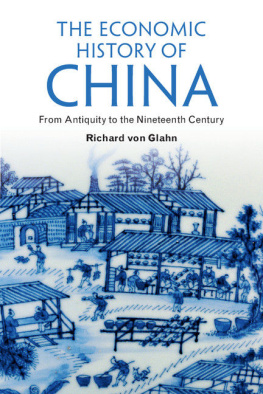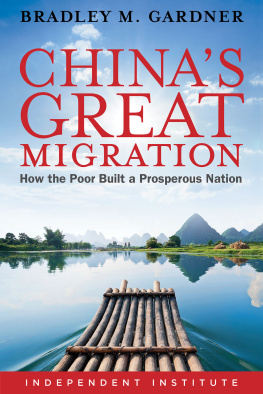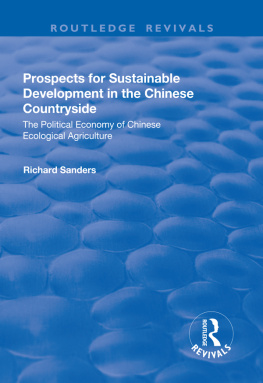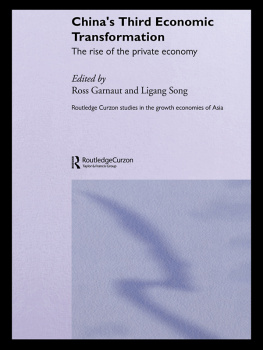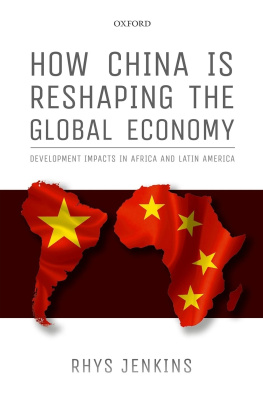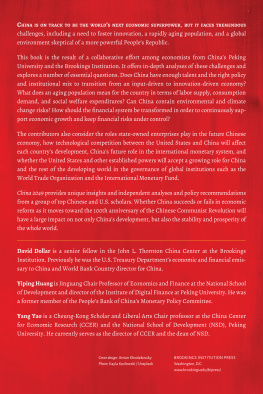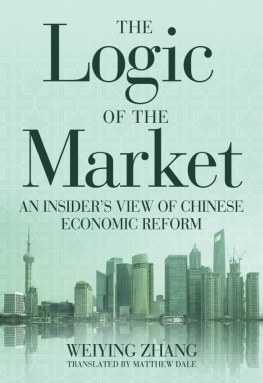Chinas extraordinary rise as an economic powerhouse in the past two decades poses a challenge to many long-held assumptions about the relationship between political institutions and economic development. Economic prosperity also was vitally important to the longevity of the Chinese empire throughout the preindustrial era. Before the eighteenth century, Chinas economy shared some of the features such as highly productive agriculture and sophisticated markets found in the most advanced regions of Europe. But in many respects, from the central importance of irrigated rice farming to family structure, property rights, the status of merchants, the monetary system, and the imperial states fiscal and economic policies, Chinas preindustrial economy diverged from the Western path of development. In this comprehensive but accessible study, Richard von Glahn examines the institutional foundations, continuities, and discontinuities in Chinas economic development over three millennia, from the Bronze Age to the early twentieth century.
Richard von Glahn is Professor of History at the University of California, Los Angeles. He has previously published three monographs on Chinese history, including Fountain of Fortune: Money and Monetary Policy in China, 10001700 (1996) and The Sinister Way: The Divine and the Demonic in Chinese Religious Culture (2004), and a co-authored textbook on world history, Crossroads and Cultures: A History of the World (2012).
University Printing House, Cambridge CB2 8BS, United Kingdom
Cambridge University Press is part of the University of Cambridge.
It furthers the Universitys mission by disseminating knowledge in the pursuit of education, learning and research at the highest international levels of excellence.
www.cambridge.org
Information on this title: www.cambridge.org/9781107030565
Richard von Glahn 2016
This publication is in copyright. Subject to statutory exception and to the provisions of relevant collective licensing agreements, no reproduction of any part may take place without the written permission of Cambridge University Press.
First published 2016
Printed in the United Kingdom by Clays, St Ives plc
A catalogue record for this publication is available from the British Library
Library of Congress Cataloguing in Publication data
Von Glahn, Richard.
An economic history of China : from antiquity to the nineteenth century / Richard von Glahn, University of California, Los Angeles.
pages cm
Includes bibliographical references and index.
ISBN 978-1-107-03056-5 (Hardback : alk. paper) ISBN 978-1-107-61570-0 (Paperback. : alk. paper) 1. ChinaEconomic conditionsTo 1644. 2. ChinaEconomic conditions16441912. I. Title.
HC427.6.V66 2015
330.951dc23 2015031124
ISBN 978-1-107-03056-5 Hardback
ISBN 978-1-107-61570-0 Paperback
Cambridge University Press has no responsibility for the persistence or accuracy of URLs for external or third-party internet websites referred to in this publication, and does not guarantee that any content on such websites is, or will remain, accurate or appropriate.
In memory of Ken Sokoloff
Contents
Figures
Maps
Tables
Acknowledgments
For two decades I had the immense good fortune of having an office adjoining that of Ken Sokoloff, one of our most distinguished scholars of economic history. Through his unflagging good cheer, robust wisdom, and ecumenical knowledge of economics and history, Ken was a steadfast source of support for my own research and writing in Chinese economic history. One could not hope for a finer colleague, or imagine a finer person. His untimely death has been an enormous loss for the field of economic history as numerous eulogists have already attested. I deeply regret that Ken did not live to see this book which in ways large and small he encouraged and nurtured appear in print. I can only acknowledge my appreciation by dedicating it to his memory, and to the ideals of scholarly community that he, more than anyone I have ever known, embodied.
R. Bin Wong and Jean-Laurent Rosenthal read drafts of each chapter and generously provided me with cogent advice and provocative criticism. I am beholden to them and to the student participants in the Cal Tech-UCLA Workshop on Chinese Economic History during the past several years Xiang Chi, Xiaowen Hao, Yifei Huang, Sunkyu Lee, Guillermo Ruiz-Stoval, Dong Yan, and Meng Zhang who also sacrificed their time and energy in reading and commenting on the entire manuscript. I have also keenly benefited from the comments and corrections provided by Lothar von Falkenhausen, Anthony Barbieri-Low, and Maxim Korolkov, each of whom read several of the early chapters of the book manuscript. I have not been able to address all of the issues raised by these readers, but their efforts have improved it significantly. Omissions are inevitable in a synthetic study like this, and no doubt errors have crept in as well; I assume responsibility for any shortcomings.
The immense debt I owe to the legions of scholars whose research has informed this study should be readily apparent, even if my references to their writings and ideas only imperfectly acknowledge their contributions. I have been extremely fortunate to receive the financial support of a fellowship from the National Endowment for the Humanities in 201011, which launched the writing of this book, and also a Guggenheim Fellowship in 201314 that enabled me to finish the writing in timely fashion. And finally, although words scarcely suffice for the task, I wish to express my gratitude to Kayoko and Erika for making this journey a joyous one.
Introduction
Until the 1960s, historians viewed Chinas history and especially its economic history through the lens of Western teleologies of historical change predicated on the progress of freedom, leading either to capitalist democracy or socialist utopia. As I have written elsewhere, whether construed in Weberin general, its unique longevity could be explained by the remarkable durability of the gentrys dominance over government office, landowning, intellectual life, and culture. In contrast, for example, to the dispersion of social power among monarchs, warriors, clerics, seigneurs, and urban corporations in medieval Europe, the gentry monopolized political, economic, and cultural authority and deflected challenges from any insurgent group, be they merchants, military officers, or disaffected intelligentsia. In the eyes of Marxist historians, the persistence of gentry rule perpetuated feudal property ownership and relations of production in which the rentier elite absorbed the surpluses generated by the peasant families under their dominion. American scholars balked at employing the category of feudalism, given its Marxist associations, but their paradigm of traditional Chinese society essentially conformed to this depiction of economic inertia.
The most potent challenges to this image of an unchanging China were voiced by Japanese historians. Nait Knan, Japanese Marxist historians, in contrast, interpreted the Tang-Song transition as the moment in which a feudal society based on serfdom eclipsed the ancient slave-labor economy. In their view, in contrast to genuine forms of feudalism to be found in the medieval eras of both Europe and Japan Chinese feudalism proved resistant to further social development because of the ineluctable tenacity of Chinas patriarchal social institutions of family, lineage, village, and guild.

